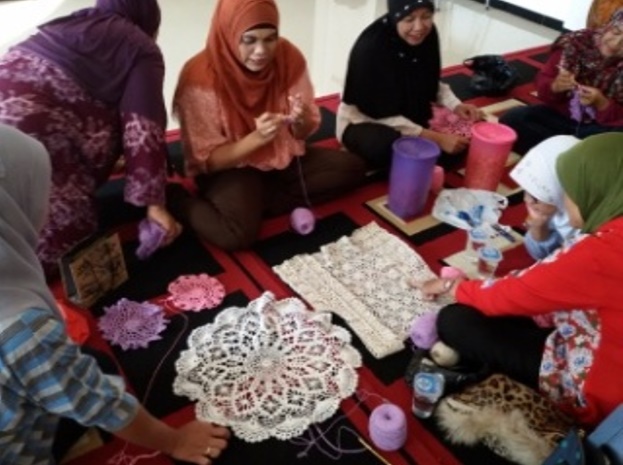Merajut Industri Kreatif di Panti Asuhan Mawaddah Warohmah melalui Pelatihan Seni Patchwork dan Lace
Main Article Content
Abstract
Mawaddah Warohmah Orphanage Malang City is the social service institutions that accommodates orphans and poor people from various regions. The skill development of the productive age orphanage children has not been maximally obtained. This program aims to improve the skills of orphans and poor people under the guidance of the orphanage through the development of creative industries that have the opportunity to become home-scale businesses. The group participation approach method in this program involves orphans and poor people under the guidance of the Orphanage actively in training and mentoring for creative classes "patchwork and lace" as well as entrepreneurship counseling and business planning. The results of the program implementation showed that 80% of orphans and poor people assisted by the Mawadah Warohmah orphanage were able to attend the training well and were shown to have skills in patchwork and lacee arts. Their craftsmanship from patchwork is demonstrated by handmade products in the form of blankets of various designs and motif modifications. Meanwhile, their works from lacee art training include handbags, scarves, tablecloths, brooches, bags, shoes and babies. clothes, and wallets. The intensive mentoring program through an alliance between the orphanage (the first partner) and Toko Jaya (the second partner) is able to support the development of creative businesses through the marketing of products produced from orphaned children and the underprivileged
Article Details

Jurnal Pemberdayaan Masyarakat is licensed under a Creative Commons Attribution 4.0 International License.
References
Buchari Alma. 2000. Kewirausahaan, Penerbit Alfabeta, Bandung.
Geoffrey G. Meredith, 2000. Penerjemah Andre Asparsayogi, Kewirausahaan Teori dan Praktek, PT Pustaka Binaman Pressindo. Jakarta.
Baswedan, A. R., Setiawan, N., & Siswanto. (2008). Staf Pengajar Jurusan Pendidikan Akuntansi – Universitas Negeri Yogyakarta 96. Jurnal Pendidikan Akuntansi Indonesia, VI(2), 96–107.
Markum, M. E. (2009). Pengentasan Kemiskinan dan Pendekatan Psikologi Sosial. Psikobuana 2009, 1(1), 1–12.
Muniri, A. S. (2016). Pengembangan Kewirausahaan Sosial bagi Pemuda Muslim Pengangguran dari Ruang Kelas. Proceeding of The International Conference on University-Community Engagement. . SURABAYA – INDONESIA, 2 - 5 AUGUST 2016, 389–408.
Mustikawati, R. I., & Widiarti, M. A. N. & P. W. (2013). Strategi Pemberdayaan Ekonomi Komunitas Waria melalui Life Skill Education. Junral Economia, 9(1), 66–80.
Reginald, A. R., & Imron Mawardi. (2014). Kewirausahaan Sosial pada Pondok Pesantren Sidogiri Pasuruan. Jurnal Ekonomi Syariah Teori Dan Terapan (JESTT), 1(5), 333–345.
Rusdianti, E., Purwantini, S., & Wahdi, N. (2019). Impact Motivasi , Kewirausahaan Sosial Terhadap Pemberdayaan Perempuan dan Pengentasna Kemiskinan ( Studi Empiris Di Kec . Ungaran Timur , Kab . Semarang ). Prosiding Seminar Nasional Dan Call For Papers:â€Fintech Dan E-Commerce Untuk Mendorong Pertumbuhan UMKM Dan Industri Kreatifâ€. Fakultas Ekonomi Universitas Tidar. 15 Oktober 2019. Magelang, 258–274.
Rusman Hakim, 1998. Dengan Wirausaha Menepis Krisis, PT Elex Media Komputindo. Jakarta.
Stephanie R.S. Tjahjadi 2007. Pachtwork, Applique & Quilting, PT Gramedia Pustaka Utama. Jakarta.
Suryana, 2008. Kewirausahaan : Pedoman Praktis, Kiat dan Proses Menuju Sukses. Salemba Empat. Jakarta.
Yasuko Kuraishi. 1996. Fun & Easy Machinework and Quiltwork, ONDORISHA Publisher. Japan


